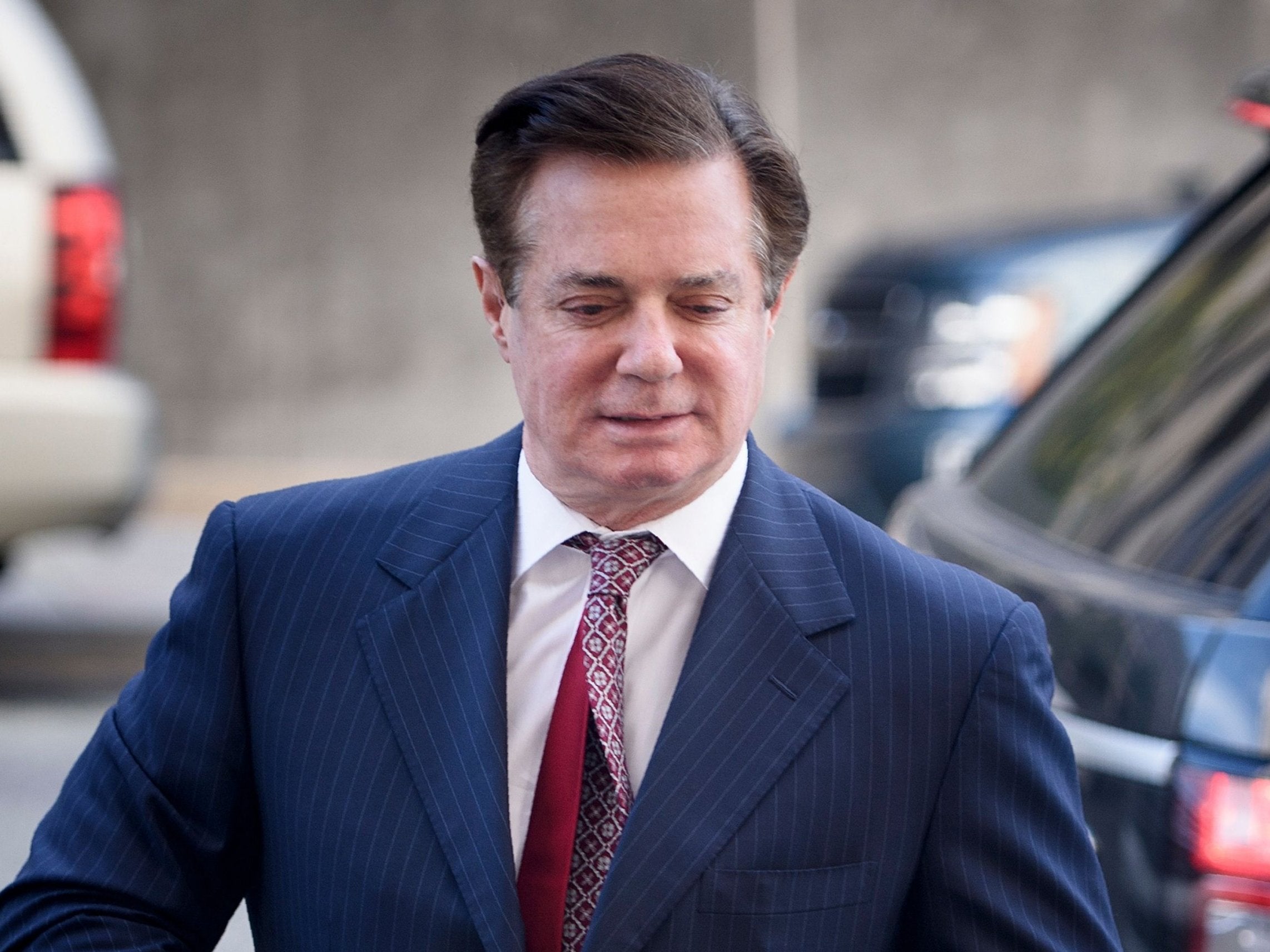Manafort trial: Jurors deliberate fate of former Trump campaign manager
'This is a case about lies', jurors were told by government prosecutors

Your support helps us to tell the story
From reproductive rights to climate change to Big Tech, The Independent is on the ground when the story is developing. Whether it's investigating the financials of Elon Musk's pro-Trump PAC or producing our latest documentary, 'The A Word', which shines a light on the American women fighting for reproductive rights, we know how important it is to parse out the facts from the messaging.
At such a critical moment in US history, we need reporters on the ground. Your donation allows us to keep sending journalists to speak to both sides of the story.
The Independent is trusted by Americans across the entire political spectrum. And unlike many other quality news outlets, we choose not to lock Americans out of our reporting and analysis with paywalls. We believe quality journalism should be available to everyone, paid for by those who can afford it.
Your support makes all the difference.After 12 days of trial, the fate of former Trump campaign chairman Paul Manafort is in the hands of the Virginia jury that has sat through the proceedings for over two weeks — a group who will be simultaneously deciding the fate of the first jury trial stemming from special counsel Robert Mueller’s investigation into Russian meddling in the 2016 campaign.
Government prosecutors have sought to prove that Mr Manafort had avoided paying US taxes on income made overseas, instead masking payments through wire transfers to high-end clothing companies and for expensive contracting work on his home in Brooklyn. In the process, prosecutors have said, Mr Manafort dragged his former deputy Rick Gates into the alleged criminality, and ultimately sought to mislead banks in order to receive hefty loans to keep Mr Manafort financially afloat.
"This is a case about lies," Greg Andres, a government prosecutor, told the jury during closing remarks Wednesday for Mr Manafort’s trial on bank and tax fraud charges.
“Mr Manafort lied to keep more money when he had it, and to get more money when he didn’t,” Mr Andres said.
In their closing remarks, the defence attacked the credibility of the evidence presented by the government before portraying Mr Gates — the prosecution’s star witness — as a deceitful man who stole millions from his boss in order to pay for a lavish lifestyle that included a secret apartment in London, where he had an extramarital affair.
Defence attorney Richard Westling told the jury during his remarks that the special counsel had cherry-picked inconsistencies from thousands of documents to bring the case forward against Mr Manafort, and told the jury that the evidence presented to them only looks like criminal actions after-the-fact, and would not have seemed so at the time.
“It’s only when the government shows up and starts asking, ‘How do you explain this?’ that people start feeling in hindsight something was wrong,” Mr Westling said.
He then attacked testimony from Mr Manafort’s former accountant Cindy Laporta, saying her testimony cannot be trusted and that she “seems like someone who worked pretty hard to stay on the right side of things. … [But] we all feel a little guilty when the FBI shows up — it’s just human nature”.
The closing remarks are the culmination of the highest profile case involving the special counsel’s 2016 Russia investigation, and stem from Mr Manafort’s time working overseas as an adviser for Ukrainians with ties to Russian president Vladimir Putin, including Ukrainian president Viktor Yanukovych.
During his time in Ukraine, Mr Manafort reportedly became a significant influence in the country, and had sway over politics as well as over policies that benefited American industries. From his work there, he was able to amass a considerable personal wealth, earning major payments for his advising work.
Government prosecutors described Mr Manafort’s efforts to allegedly avoid taxes back in the US after making all that money, buying up expensive clothing like ostrich leather jackets, and opulent suits using offshore accounts that made the origins of the money difficult to trace. Instead of paying for those expenses through a credit or debit card, the prosecutors said, Mr Manafort had the payments wired through Cyprus bank accounts — thus obscuring the origins of the money.
Mr Manafort later moved back to the US where he and Mr Gates joined the 2016 Trump campaign, a time during which the prosecution suggested that he was under considerable financial duress.
The outcome of the trial could have major implications for President Trump, his administration, and any aides who may have information that could interest Mr Mueller’s team.
While the case itself has largely been considered one that is only tangentially connected to Mr Trump’s campaign, a win for Mr Mueller’s team could send concerned shockwaves through those close to the president and heighten the anticipation for Mr Mueller’s next move. At the same time, a loss would likely turn the volume up on calls for the end of the special counsel investigation.
Mr Manafort is facing 18 charges of tax and banking crimes. He has pleaded not guilty to each charge. Mr Gates has agreed to work with prosecutors, and has pleaded guilty to similar charges levied against Mr Manafort.
Join our commenting forum
Join thought-provoking conversations, follow other Independent readers and see their replies
Comments